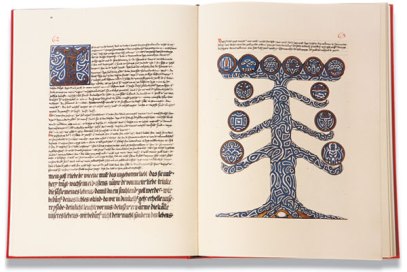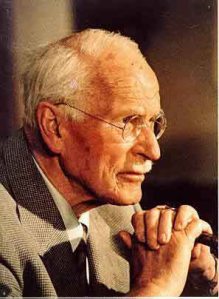It took a few weeks, but my hold on Jung’s Liber Novus aka The Red Book (TRB), finally wound its way through the public library system back to my branch.

I’ll begin with practicalities. TRB is a seriously weighty tome. I think it must weigh more than a newborn baby. It’s roughly the size of a large laptop, and three times as thick. Being someone who reads on the go with a preference for light, slip in my purse novels, this was quite a demanding read, logistically. The large size however, does afford very detailed and beautiful reproductions of Jung’s original illuminated texts. You can even sometimes see the original pencil work made before being filled in with ink. One understands why such a size was chosen; TRB is replete with gorgeous artwork and it is simply a pleasure to pore over Jung’s caligraphic hand and his intricate illustrations.
 The text itself is fascinating, and offers an intimate window into Jung’s “confrontation with the unconscious” after his falling out with Freud. One can see immediately, why he may have had reservations in sharing TRB given his scientific background and, on a more impersonal level, the drive for psychiatry – a fledgling practice at the time – to align itself with the legitimacy and biopower of medicine. Jung basically describes various journeys into psychological landscapes and records his observations of and conversations with beings he encounters along the way; one can imagine how this could weaken his credibility as a scientist.
The text itself is fascinating, and offers an intimate window into Jung’s “confrontation with the unconscious” after his falling out with Freud. One can see immediately, why he may have had reservations in sharing TRB given his scientific background and, on a more impersonal level, the drive for psychiatry – a fledgling practice at the time – to align itself with the legitimacy and biopower of medicine. Jung basically describes various journeys into psychological landscapes and records his observations of and conversations with beings he encounters along the way; one can imagine how this could weaken his credibility as a scientist.
In style, the writing is most like Jung’s Septem Sermones ad Mortuos which were published as an appendix to his autobiography, Memories, Dreams, Reflections. It has a reverential, pseudo religious, mythical tone throughout and one is vaguely reminded of Milton or Blake.
I would not recommend TRB for anyone seeking an understanding of Jung’s theories or for readers who do not have a basic understanding of them. Memories, Dreams, Reflections, his layman’s publication, Man and His Symbols, as well as secondary texts by Edinger or Louise von Franz, would be more suitable for introductory purposes. TRB is better for readers seeking to deepend their understanding of the development of Jung’s thought, or who are interested in the process of active imagination. You can see quite clearly how Jung is capable of extremely vivid imagery that is partly self directed, and partly not, and that these are not really hallucinogenic visions. For OTO readers, this might be one way to develop content for one’s magickal diary.
Personally, I have practised active imagination since my teens, before I ever learned of Jung’s work. I have found it to be incredibly fruitful and illuminating, but, as with reading tarot, this practice requires a high degree of discernment lest one project messages or ideas or images from the ego and attribute these to the Self or anything other than the grasping of the ego. Certainly, looking back, I would imagine that a strong vipassana practice would go a long way in abetting such tendencies.
p.s. You may have noticed the removal of this blog’s previous post, What is Community? I felt it was too long, unwieldly and not well thought out. Also, in light of the recent blow up in the Anusara Yoga community, I would prefer to refrain from any kind of commentary on yoga communities at this time.


 The text itself is fascinating, and offers an intimate window into Jung’s “confrontation with the unconscious” after his falling out with Freud. One can see immediately, why he may have had reservations in sharing TRB given his scientific background and, on a more impersonal level, the drive for psychiatry – a fledgling practice at the time – to align itself with the legitimacy and biopower of medicine. Jung basically describes various journeys into psychological landscapes and records his observations of and conversations with beings he encounters along the way; one can imagine how this could weaken his credibility as a scientist.
The text itself is fascinating, and offers an intimate window into Jung’s “confrontation with the unconscious” after his falling out with Freud. One can see immediately, why he may have had reservations in sharing TRB given his scientific background and, on a more impersonal level, the drive for psychiatry – a fledgling practice at the time – to align itself with the legitimacy and biopower of medicine. Jung basically describes various journeys into psychological landscapes and records his observations of and conversations with beings he encounters along the way; one can imagine how this could weaken his credibility as a scientist.


